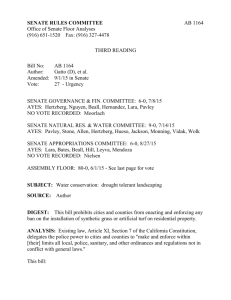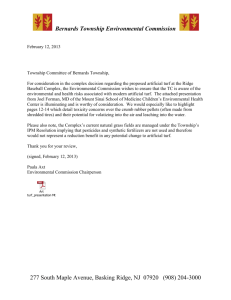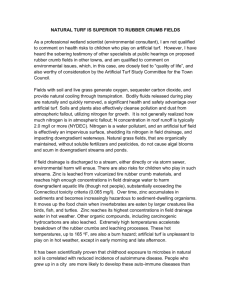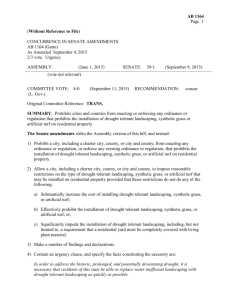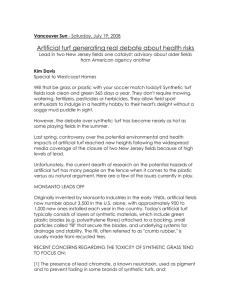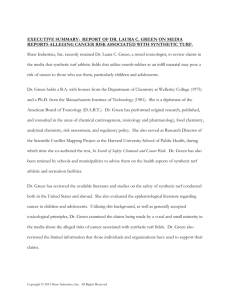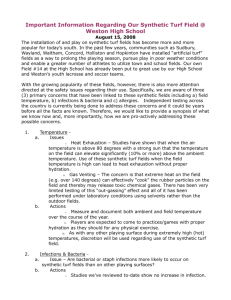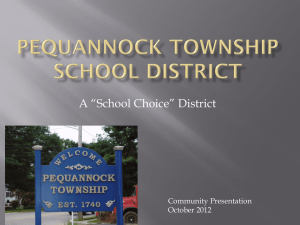Sen. Governance and Finance
advertisement
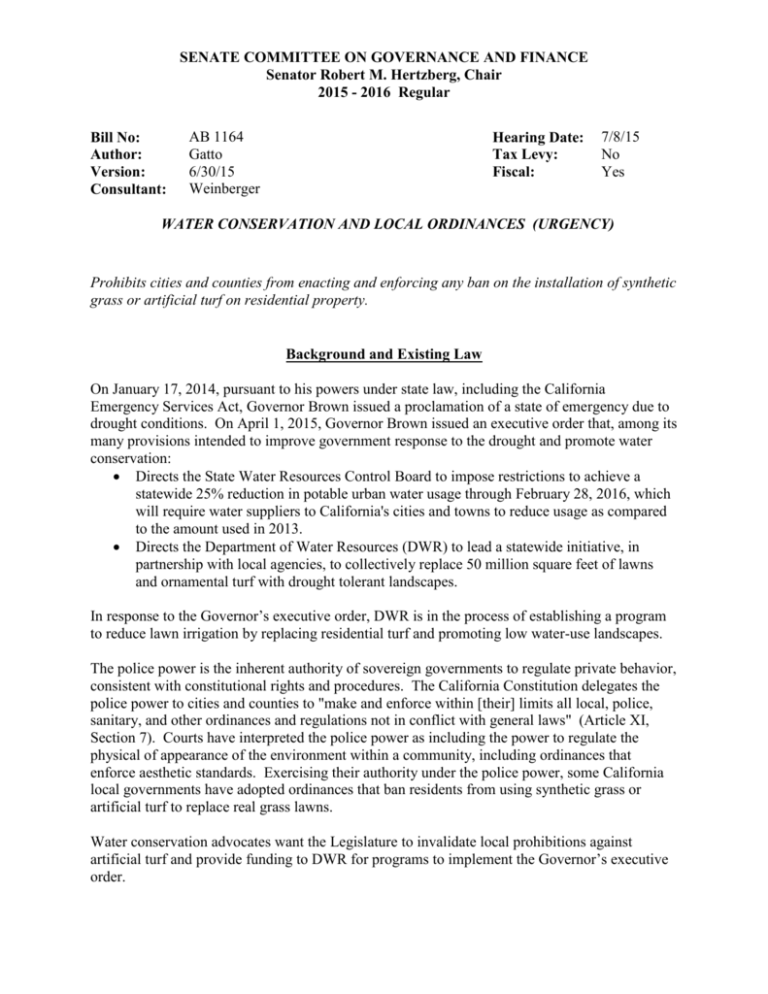
SENATE COMMITTEE ON GOVERNANCE AND FINANCE Senator Robert M. Hertzberg, Chair 2015 - 2016 Regular Bill No: Author: Version: Consultant: AB 1164 Gatto 6/30/15 Weinberger Hearing Date: Tax Levy: Fiscal: 7/8/15 No Yes WATER CONSERVATION AND LOCAL ORDINANCES (URGENCY) Prohibits cities and counties from enacting and enforcing any ban on the installation of synthetic grass or artificial turf on residential property. Background and Existing Law On January 17, 2014, pursuant to his powers under state law, including the California Emergency Services Act, Governor Brown issued a proclamation of a state of emergency due to drought conditions. On April 1, 2015, Governor Brown issued an executive order that, among its many provisions intended to improve government response to the drought and promote water conservation: Directs the State Water Resources Control Board to impose restrictions to achieve a statewide 25% reduction in potable urban water usage through February 28, 2016, which will require water suppliers to California's cities and towns to reduce usage as compared to the amount used in 2013. Directs the Department of Water Resources (DWR) to lead a statewide initiative, in partnership with local agencies, to collectively replace 50 million square feet of lawns and ornamental turf with drought tolerant landscapes. In response to the Governor’s executive order, DWR is in the process of establishing a program to reduce lawn irrigation by replacing residential turf and promoting low water-use landscapes. The police power is the inherent authority of sovereign governments to regulate private behavior, consistent with constitutional rights and procedures. The California Constitution delegates the police power to cities and counties to "make and enforce within [their] limits all local, police, sanitary, and other ordinances and regulations not in conflict with general laws" (Article XI, Section 7). Courts have interpreted the police power as including the power to regulate the physical of appearance of the environment within a community, including ordinances that enforce aesthetic standards. Exercising their authority under the police power, some California local governments have adopted ordinances that ban residents from using synthetic grass or artificial turf to replace real grass lawns. Water conservation advocates want the Legislature to invalidate local prohibitions against artificial turf and provide funding to DWR for programs to implement the Governor’s executive order. AB 1164 (Gatto) 6/30/15 Page 2 of 3 Proposed Law Assembly Bill 1164 prohibits a city, including a charter city, county, or city and county, from enacting any ordinance or regulation, or enforcing any existing ordinance or regulation, that prohibits the installation of synthetic grass or artificial turf on residential property. AB 1164 makes a continuing appropriation of $300 million from the General Fund to the Department of Water Resources to be expended in equal shares of $100 million for each of the 2015–16, 2016–17, and 2017–18 fiscal years to provide matching funds to any city, county, city and county, public water agency, or private water agency to provide incentives to residents to replace water inefficient landscaping with drought tolerant landscaping. State Revenue Impact No estimate. Comments 1. Purpose of the bill. According to the Department of Water Resources, landscape irrigation represents 43 percent of urban water use. Installing synthetic grass or artificial turf to replace conventional lawns can directly reduce outdoor water use to help meet statewide water use reduction goals. California’s prolonged drought requires that no possible water-savings options should remain unavailable to the state’s residents. AB 1146 provides an urgent response to emergency drought conditions by allowing property owners throughout the state to install watersaving synthetic grass and by supporting DWR’s programs to promote water-conserving landscapes. 2. Middle ground? The severe drought conditions confronting California make it difficult to justify local ordinances that completely prohibit a resident from installing water-conserving synthetic turf. However, health concerns and aesthetic preferences may warrant some local regulation of what types of turf that residents are allowed to install. The Committee may wish to consider amending AB 1164 to allow local ordinances that prohibit specific types of turf that don’t meet specified health or aesthetic standards, as long as those local prohibitions don’t effectively ban the use of any type of synthetic turf within a local jurisdiction. 3. Related legislation. AB 349 (Gonzalez, 2015) would void, or make unenforceable, any provision of a common interest development’s governing document or architectural or landscaping guidelines or policies that prohibit the use of artificial turf or any other synthetic surface that resembles grass. AB 349 is currently awaiting a hearing in the Senate Judiciary Committee. In 2011, Governor Brown vetoed SB 759 (Lieu), which contained language identical to AB 349. The Governor’s veto message stated: Under this bill, homeowners associations that govern Common Interest Developments would be forced to approve the installation of Astro Turf. The decision about choosing synthetic turf instead of natural vegetation should be left to individual homeowners associations, not mandated by state law. For this reason, I am returning this bill. 4. Charter cities. The California Constitution allows cities that adopt charters to control their own “municipal affairs.” In all other matters, charter cities must follow the general, statewide laws. Because the Constitution doesn’t define “municipal affairs,” the courts determine whether AB 1164 (Gatto) 6/30/15 Page 3 of 3 a topic is a municipal affair or whether it’s an issue of statewide concern. AB 1164 says that it applies to all cities, including charter cities. To support this assertion, the bill includes a legislative finding and declaration that the bill's provisions are a matter of statewide concern because allowing property owners to install synthetic grass or artificial turf will advance the state’s long-water conservation goals in response to prolonged drought conditions. 5. Urgency. Regular statutes take effect on January 1 following their enactment; bills passed in 2015 take effect on January 1, 2016. The California Constitution allows bills with urgency clauses to take effect immediately if they're needed for the public peace, health, and safety. AB 1164 contains an urgency clause declaring that it is necessary for its provisions to go into effect immediately to enable California residents to replace water inefficient landscaping with drought tolerant landscaping as quickly as possible. 6. Double-referred. The Senate Rules Committee has ordered a double-referral of AB 1164 -first to the Senate Governance & Finance Committee, which has jurisdiction over bills relating to local governments’ police powers, and then to the Senate Natural Resource & Water Committee, which has jurisdiction over bills relating to the Department of Water Resources’ programs to replace residential turf and promote drought-tolerant landscaping. 7. Gut-and-amend. As passed by the Assembly, AB 1164 contained provisions relating to the evaluation and rating of the overall quality of the state highway system. The Senate Governance & Finance Committee never heard that version of the bill. The June 22 amendments deleted AB 1164's contents and inserted the current language relating to local agencies’ synthetic turf ordinances and DWR’s drought-tolerant landscaping programs. Assembly Actions Not relevant to the June 30, 2015 version of the bill. Support and Opposition (7/2/15) Support: American Planning Association; California Association of Realtors; Metropolitan Water District of Southern California; Three Valleys Municipal Water District. Opposition: Unknown. -- END --
